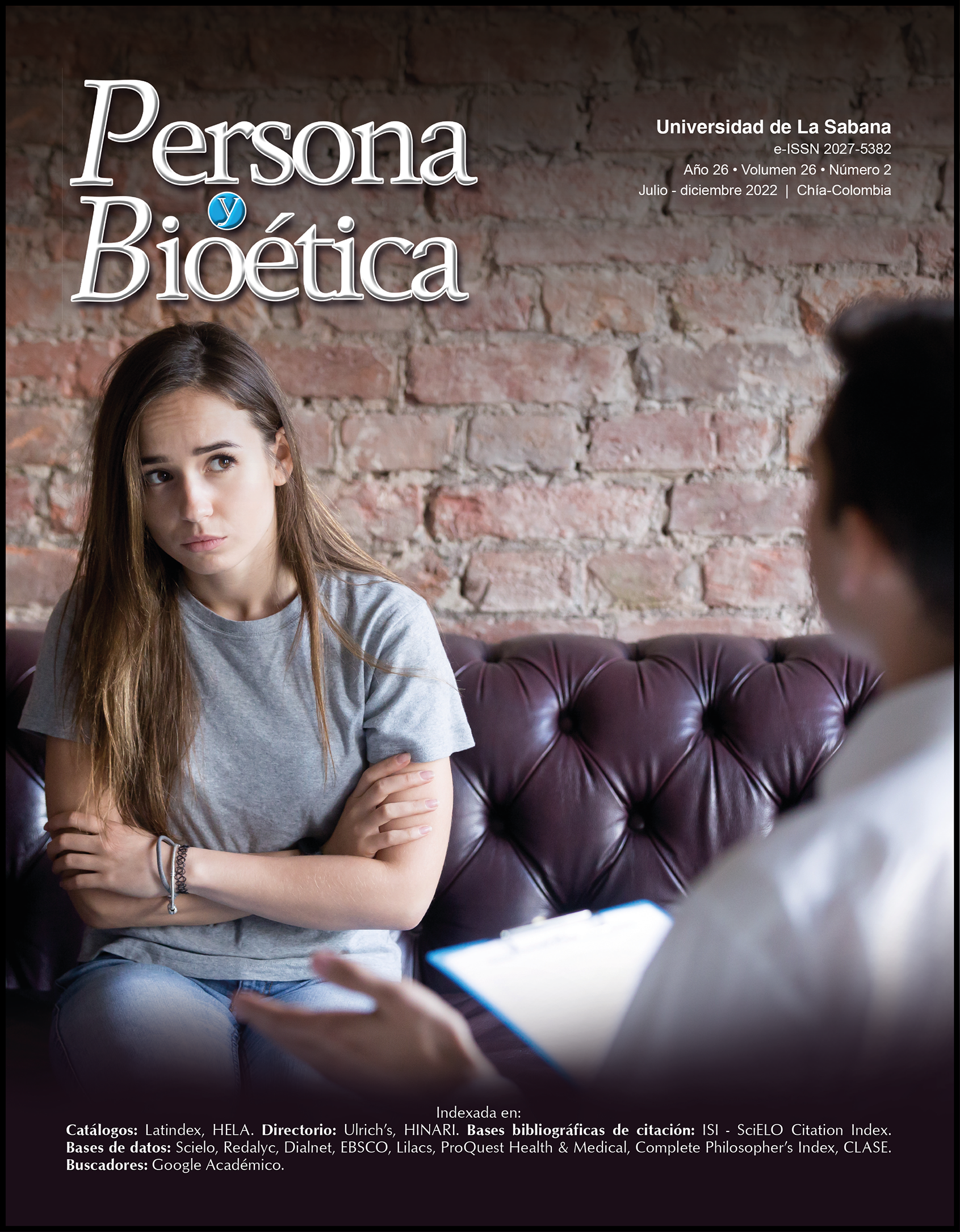The Importance of Doctor-Patient Communication: A Study in Argentina
DOI:
https://doi.org/10.5294/pebi.2022.26.2.5Keywords:
Physician-patient relations, communication skills, medical education, ethics, bad news, communicationAbstract
Objective: To discuss the importance of communication in the doctor-patient relationship and collect information about perception during their practice. Materials and methods: A literature review and a survey were conducted (105 doctors in Argentina participated). Results: Most professionals report communication difficulties, which hinder care. Physicians expressed difficulties communicating bad news, primarily in clinical areas, and the ability to put themselves in the patient’s shoes is essential for giving such news. Young people significantly consider that the communication of bad news depends on practice. Conclusions: Communication skills are critical. Evidence suggests that it is necessary to look into the acquisition of communication skills and ethical values.
Downloads
References
De las Heras J. La relación médico-paciente. En: Polaino-Llorente A. Manual de Ética General. Madrid: Rialp; 1994. p. 271-278
Mendoza A. La relación médico paciente: consideraciones bioéticas. Rev Peru Ginecol Obstet. 2017;63(4):555-564. DOI: https://doi.org/10.31403/rpgo.v63i2029
Peretti MCV. La relación médico-paciente. En: Fahrer RD y Magaz A. Temas de psicología médica. Buenos Aires: CTM Servicios Bibliográficos; 1988. p 107-134.
Molina-Mula J, Gallo-Estrada J, Perelló-Campaner C. Impact of interprofessional relationships from nurses’ perspective on the decision-making capacity of patients in a clinical setting. Int J Environ Res Public Health. 2017;15(1):49. DOI: https://doi.org/10.3390/ijerph15010049
Hernández-Torres I, Fernández-Ortega MA, Irigoyen-Coria A, et al. Importancia de la comunicación médico-paciente en medicina familiar. Archivos en Medicina Familiar. 2006;8(2):137-144.
Pellegrino ED. The relationship of autonomy and integrity in medical ethics. Bull Pan Am Health Organ. 1990;24(4):361-371.
Persaud-Sharma D, Govea M, Hernández R. Medical ethics and the biopsychosocial model for patient care: a case analysis for improved communication, clinical time, and error avoidance. Cureus. 2020;12(6):e8535. DOI: https://doi.org/10.7759/cureus.8535
Herranz G. Comentarios al Código de Ética y Deontología Médica. Pamplona: Eunsa; 1995.
Varkey B. Principles of clinical ethics and their application to practice. Med Princ Pract. 2021;30(1):17-28. DOI: https://doi.org/10.1159/000509119
Flórez Lozano JA, Martínez Suárez PC, Valdés Sánchez C. Análisis de la comunicación en la relación médico-paciente. Med Integral. 2000;36(3):113. Disponible en: https://www.elsevier.es/es-revista-medicina-integral-63-articulo-analisis-comunicacion-relacion-medico-paciente-15330
Van-der Hofstadt Román CJ, Quiles-Marcos Y, Quiles-Sebastián MJ. Técnicas de comunicación para profesionales de enfermería. [Internet]Valencia: Generalitat Valenciana; 2006. [Consulta: 3 jul 2021]. Disponible en: https://www.aeesme.org/wp-content/uploads/2014/11/Tecnicas-de-comunicacion-en-Enfermeria.pdf
Seidlein AH, Salloch S. Illness and disease: an empirical-ethical viewpoint. BMC Med Ethics. 2019;20(5). DOI: https://doi.org/10.1186/s12910-018-0341-y
Batten JN, Wong BO, Magnus DC. Response to commentaries: when “everyday language” contributes to miscommunication in serious illness. Camb Q Healthc Ethics. 2019;28(3):433-438. DOI: https://doi.org/10.1017/S0963180119000355
Batten JN, Wong BO, Hanks WF, Magnus DC. Treatability statements in serious illness: the gap between what is said and what is heard. Camb Q Healthc Ethics. 2019;28(3):394-404. DOI: https://doi.org/10.1017/S096318011900029X
Agozzino E, Borrelli S, Cancellieri M, Carfora FM, Di Lorenzo T, Attena F. Does written informed consent adequately inform surgical patients? A cross sectional study. BMC Med Ethics. 2019;20(1):1 . DOI: https://doi.org/10.1186/s12910-018-0340-z
Habermas J. The theory of communicative action: reason and the rationalization of society. Boston: Beacon Press; 1984.
Bateman LB. Exploring Habermas’ theory of communicative ethics as an approach to physician communication training: the case of pediatric end-of-life care. Soc Theory Health. 2018; 16:60-76. DOI: https://doi.org/10.1057/s41285-017-0043-4
Caridi Family, Poduri A, Devinsky O, et al. Experiencing positive health, as a family, while living with a rare complex disease: bringing participatory medicine through collaborative decision making into the real world. J Particip Med. 2020;12(2): e17602. DOI: https://doi.org/10.2196/17602
Alves de Lima. Habilidades de comunicación: un pilar básico de la competencia clínica. Revista del Conarec. 2003;19(68):19-24.
Real Academia Española. Informar. [Internet]. Diccionario de la Lengua Española. Madrid: Real Academia Española; 2021 [consulta: 16 jul 2021]. Disponible en: https://dle.rae.es/informar
Real Academia Española. Comunicar. [Internet]. Diccionario de la Lengua Española. Madrid: Real Academia Española; 2021 [consulta: 16 jul 2021]. Disponible en: https://dle.rae.es/comunicar
Ramírez-Ibáñez MT, Ramírez-de la Roche OF. Cómo comunicar malas noticias en la práctica médica. Aten Familiar. 2015;22(4):95-96. DOI: https://doi.org/10.1016/S1405-8871(16)30060-8
Monteiro MC, Magalhães AS, Féres-Carneiro T. et al. Terminality in the ICU: the emotional and the ethical dimensions of the medical care of the intensivist. Psicologia em Estudo. 2016;21(1). DOI: https://doi.org/10.4025/psicolestud.v21i1.28480
Dalal S, Moore JA, Gallagher CM. “We didn’t consent to this”. Narrat Inq Bioeth. 2017;7(2):171-178. DOI: https://doi.org/10.1353/nib.2017.0047
Herranz G. Aspectos éticos de la relación paciente-médico-instituciones públicas de salud. [Internet] Conferencia dictada en Ferrara, 2002. [Consulta: 16 jul 2021] Disponible en: https://www.unav.edu/web/unidad-de-humanidades-y-etica-medica/material-de-bioetica/conferencias-sobre-etica-medica-de-gonzalo-herranz/aspectos-eticos-de-la-relacion-paciente-medico-instituciones-publicas-de-salud
Filip-Ciubotaru F, Scripcaru C, Manciuc C, et al. Bioethical considerations within master-doctor binomial. Romanian J Bioeth. 2009;7(4):127-132. Disponible en: https://www.proquest.com/openview/129396faefb1504f6fcb0ac8eb78e06c/1.pdf?pq-origsite=gscholar&cbl=1536336
Slort W, Schweitzer BP, Blankenstein AH et al. Perceived barriers and facilitators for general practitioner-patient communication in palliative care: a systematic review. Palliat Med. 2011;25(6):613-29. DOI: https://doi.org/10.1177/0269216310395987
Jiang Y. Shi, L. Cao J. et al. Effectiveness of clinical scenario dramas to teach doctor-patient relationship and communication skills. BMC Med Educ. 2020;20:473 . DOI: https://doi.org/10.1186/s12909-020-02387-9
Morris DA, Johnson KS, Ammarell N et al. What is your understanding of your illness? A communication tool to explore patients’ perspectives of living with advanced illness. J Gen Intern Med. 2012;27(11):1460-1466. DOI: https://doi.org/10.1007/s11606-012-2109-2
Holmgren L. Empathic communications and narrative competence in contemporary medical education. Enthymema. 2016;(16):90-104. DOI: https://doi.org/10.13130/2037-2426/7662
Published
How to Cite
Issue
Section
License
Copyright (c) 2023 Maria del Pilar Lopez Gabeiras

This work is licensed under a Creative Commons Attribution-NonCommercial-NoDerivatives 4.0 International License.
Authors who publish with this journal agree to the following terms:
This journal and its papers are published with the Creative Commons License Attribution-NonCommercial-NoDerivatives 4.0 International (CC BY-NC-ND 4.0). You are free to share copy and redistribute the material in any medium or format if you: give appropriate credit, provide a link to the license, and indicate if changes were made; don’t use our material for commercial purposes; don’t remix, transform, or build upon the material.









